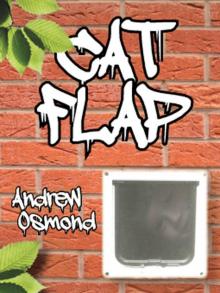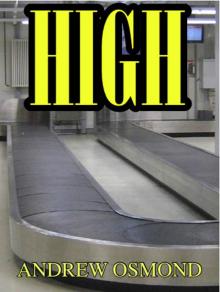- Home
- Andrew Osmond
Cat Flap Page 6
Cat Flap Read online
Page 6
Chapter Six: Wednesday
“By 1966 reports of sightings of the Surrey puma were becoming more common, to such an extent that it was mooted that there might be more than one creature at large in the countryside: the Crondal Cougar and the Munstead Monster were born by imaginative journalists.”
Art looked in the bathroom mirror and sighed. He examined his reflection with a critical eye, at the same time rubbing his hand across the stubble on his chin. He hadn’t shaved for four days. Hadn’t seemed to find the time, somehow. He hadn’t had a bath since Monday. It was just as well that he was not going to work today, his fellow commuters would start complaining if he delayed his ablutions any longer.
Luke was safely in his playpen in the lounge, trapped in his little four-by-four padded domain. Art reckoned that he had about twenty minutes grace before he started bawling; he was usually quite content to play on his own, first thing in the morning when he was still half-asleep, and it gave Art the opportunity to have a wash, brush his teeth, and make himself something for breakfast. If he was really lucky, he could sometimes even manage to read a bit, over his toast and coffee. This morning he had opened the letter from Amanda that had arrived the day before. He knew it was from her the second he saw the envelope waiting for him on the front doormat beneath the letterbox: even though the address had been typed, he recognized the tiny, functional U.S. postage stamps and saw the New York franking marks.
She was doing well: that was good. She had sent him a cheque: that was handy. She had gone to a film premiere: that was interesting. She had had dinner at Nobu, black cod: lovely, and also at A.D.N.Y., Alain Ducasse in case he didn’t know: he didn’t. She had tickets for the opening night of The Crucible. Arthur Miller. He knew that. With Liam Neeson: that was nice. At the Virginia Theatre on Broadway: how pleasant. He really didn’t look too bad, he thought. Hair could do with a cut, but he could still get away with being taken for under thirty. Couldn’t he? Not too many lines. And the woman in the park had definitely smiled at him. She wouldn’t have done that if he had looked like a weirdo. Would she? The circulation of the magazine was going up: that was nice. Her contract had been confirmed: that was good. It looked like she would get a pay increase: that was very good. She would be able to afford an apartment closer to the centre of town: terrific. She had been skating in Central Park: that was exciting. He could still manage a twinkle in his eyes. And most people said that he had a nice smile. All his own teeth, too. All except for that black one at the back which he needed to have pulled out. No sign of a beer gut, now John couldn’t say the same. Slim. That would be an accurate description for him. And not short. Although, not exactly tall either. But then you could be too tall, so that was not always a good thing. Big bloke, big ego, that was what he had heard one woman say. Once. She was definitely doing very well, no arguing with that. And that was just great. But she wasn’t going to be able to come home this month. Deadlines, you know. He guessed that he did. Or next month either, because she had been invited to join some friends in the Appalachians. Friends? But she would try to get back some time after Easter. She asked if he was well: which was nice. And if Luke was okay: which was good. Although she didn’t mention his birthday: which was strange. Or ask if he was walking. Or if he had had his M.M.R.. And she didn’t say that she missed them. But she didn’t say that she didn’t, so perhaps that was a given. Although she asked if he was happy, and she hoped that he was.
Happy? Happy, darling? It sounded like the sort of question that was either asked at the very beginning or at the very end of a relationship. When you already knew that the answer was either a definite yes, or a definite no. Happiness. It was a path that Art had always made his personal ambition to follow, but sometimes circumstances could knock you from the ideal route. He remembered a geography teacher that he had had in his first year of grammar school - Mr. Leighton, was that his name? - he was someone who, at the time, was widely recognized amongst the boys as a vindictive bastard; a bully who enjoyed humiliating his young charges; a teacher that you did not cross, with a quick-fire temper and a reputation for meting out punishment. In hindsight, though, he was actually something of a forward thinker. Perhaps even an inspiration. Art recalled how he used to begin each lesson with a period of reflection, meditation almost, requesting the boys to sit quietly and relax; to feel the weight of their bodies on their chairs; to listen to the furthest sounds; to breathe, in and out, slowly and steadily; to empty their minds of all negative thoughts. At the time, such talk was only further proof to the class of eleven year olds, that the man was quite clearly unhinged. Now, he would probably be regarded as an early exponent of Zen teaching in the Western classroom. A man ahead of his time. A man who asked the big questions. One day in class, halfway through a lesson on plate tectonics, he stopped and suddenly asked “What is the meaning of life?” Hands were slow to go up - Mr. Leighton was not someone with whom you risked a wrong answer - but Art had always liked to consider himself something of a closet philosopher and raised his hand, only to find himself in competition in the “Me, sir.” stakes with his arch rival, the loathsome Brownan. Art stretched his hand higher, desperate to be noticed, he knew the answer, he would have his moment, only for Mr. Leighton to turn enquiringly to his fellow pupil, “Brownan?”
Art was treated to a smug sideways glanced before Brownan answered, “To be wealthy, sir.”
Mr. Leighton smiled. Not looking in Art’s direction, he called out, “Madison, anything to add?”
“To be happy, sir. The answer is, to be happy.”
The day was won. The memory still made Art smile, as Brownan received a sharp clip around the ear and was told to stand outside in the corridor, in abject humiliation, for the remainder of the lesson, and he, Arthur Madison, received the congratulations of his teacher, the plaudits of his peers, and an additional gold star in his exercise book. To be happy. It was a philosophy with which to guide one through life. Art thought back critically. To be happy. By and large, it had stood him in pretty good stead. And of the evil Brownan? The last time that Art had heard any mention of him he had just made his first million as an I.T. consultant and was living in the U.S.. Sad.
Art shook his head and sighed once again. His reflection had not greatly changed since last he looked. He still hadn’t got around to shaving. He stroked his chin one more time. Perhaps he could put it off until tomorrow?
•••
“I’ve already told you,” said Michael Jones, annoyed now by the constant need for repetition, “I know nothing about any cash box.”
James Leigh was persistent, “So how do you explain your name appearing on one of these copy receipts we found inside?”
“Hardly likely to have a receipt made out to myself, am I now.”
Even Leigh could see the logic in this, but he was not prepared to let Mick Jones off so lightly, “So, what is the receipt in connection with?”
“You what?”
Leigh took pains to spell out what he meant, “I am asking you what it was that you purchased that this receipt relates to?”
Jones was still defiant, “How should I know. I buy plenty of stuff.”
“But this is hand-written. Most shops give a printed receipt. So was this for something special? Take a look at the writing. Do you recognize it?”
Jones barely glanced at the scrap of paper, “No.”
“It is dated only two weeks ago. Surely you must remember what you bought?”
“Mr. Leigh,” Mick Jones’s voice was weary as he tried to explain, “I buy lots of goods for the farm. Food for the animals. Fertilizer. Plant, you know. I pay up front. Normally with cash. Sometimes I get a receipt, sometimes I don’t. Most of my suppliers are like me. Smallholders. We exchange services. How am I supposed to account for every last penny? I’ve got better things to do with my time. This receipt,” he took the paper from the detectiv
e’s hand and examined it more closely, “it’s got no name on the top, no description of what it’s for. I really don’t know. I’ve never seen it before. Perhaps you should be investigating reports of missing cash boxes, this has got nothing to do with me.”
James Leigh was not convinced by Jones’s denial but he took back the receipt with a “Thank you for your time.”
Feeling more confident, Mick asked, “And what about my property? My knife and stuff, any sign? What is happening with your investigation of them, that’s what I’d like to know?”
“You’ll hear from us as soon as we find out anything more.” If it sounded rather like a threat, it was meant to.
•••
Luke’s playpen was a surreal world of pale blue cats, furry frogs that laughed when you sat on them, and wild, misshapen humanoid forms - the home-knit manifestation of a clearly disturbed mind. Luke sat amidst the chaos and chuckled to himself. He lifted both arms up in the air and then threw himself forward so that his legs and body were almost parallel to one another, displaying a suppleness of torso that would have been the envy of an Olympic gymnast. He straightened up and laughed again.
Art watched him with a mixture of amusement and bemusement from the concealment of the kitchen door, from where he could see and yet not been seen, and wondered - not for the first time - if his son was not entirely normal.

 Cat Flap
Cat Flap Big Fish
Big Fish High
High